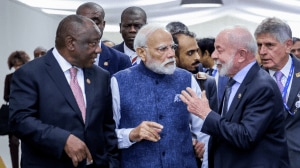Thank you, says Mayawati; Babri’s Big Three accused breathe more easy
Just a week before the Supreme Court’s deadline for issuing a fresh notification on the Babri Masjid case was to expire, Chief Minister...

Just a week before the Supreme Court’s deadline for issuing a fresh notification on the Babri Masjid case was to expire, Chief Minister Mayawati today announced that she had decided against it. This will obviously go a long way in cementing her relationship with the BJP—at least, for now.
For, it’s a major reprieve for Deputy Prime Minister L K Advani, Human Resource Development Minister Murli Manohar Joshi, Sports Minister Uma Bharti and a number of other BJP and VHP leaders accused in the Babri Masjid demolition case.
Advani is scheduled to share the dais with Mayawati and Kanshi Ram in Lucknow at a public meeting on September 28.
Mayawati claimed that her decision doesn’t mean that ‘‘the accused leaders in the Ayodhya case will escape trial.’’ She said that they could be tried in (an)other court than the one where the ‘‘earlier notification was quashed on a technical error on February 12, 2000.’’
‘‘The CBI has an option, and if it wants, it can file the case in the Rae Bareilly special court (where the case is on) and get the trial started. A fresh notification is unnecessary,’’ she said.
This claim is specious. When the case concerned—FIR No 198/92 dealing with inflammatory speeches delivered by eight specific leaders from a makeshift dais near Babri Masjid on the fateful day—moves from the special court in Lucknow to the sessions court in Rai Bareilly, the proceedings will have to take place afresh. The CBI will have to file a fresh chargesheet and the judge will have to frame charges afresh before putting those leaders on trial.
Given the fact that the special court itself took almost a decade to frame charges against accused in the main case related to the demolition, the chances of the ordinary court putting the leaders on trial at this belated stage seem remote. The leaders got away when the Allahabad High Court ruled in February 2001 that the state’s notification referring FIR No 198/92 to the special court was procedurally defective because the government failed to take the prior consent of the Chief Justice of the high court.
The high court had then suggested that the state could easily cure the defect by taking the Chief Justice’s consent on the notification before referring back the case to the special court. The Rajnath Singh Government sat on this matter for many months claiming that the legal department was studying the options.








- 01
- 02
- 03
- 04
- 05























